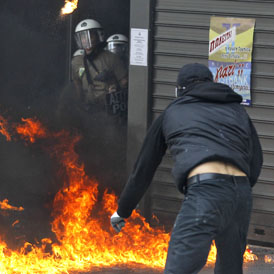Greek PM to unveil new government
Greek Prime Minister George Papandreou is to unveil a new cabinet and seek a vote of confidence from his Socialist party to try to push through an austerity package and avoid default.

In a televised address Mr Papandreou said he would form a new government on Thursday and seek a vote of confidence from his PASOK parliamentary group.
It came as the opposition turned down his offer to stand down to help the formation of a unity government in order to pass deep austerity measures, amid violence on the streets of the capital.
Opposition conservatives insisted a unity government was only possible if the bailout was renegotiated. Greek opposition leader Antonis Samaras called for early elections after talks to form the unity government failed.
Mr Papandreou, who will stay in his post, must pass a new five-year campaign of tax rises, spending cuts and sell-offs of state property to receive a new EU and IMF bailout.
The package, worth 28bn euros (£24.6bn) in cuts and tax hikes to take effect from 2012 to 2015, must also be passed for the release of the next tranche of aid – 12bn euros – as part of Greece’s 110bn euro bailout last year.
The Greek Prime Minister, who came to power in 2009, may replace Finance Minister George Papaconstantinou, the main architect of hugely unpopular budget cuts demanded by the EU and the IMF as part of Greece’s 110bn euro bailout last year.
Mass unrest
Earlier on Wednesday, tens of thousands of Greeks massed outside parliament, during the third general strike this year.
Protesters threw petrol bombs and clashed with police at buildings housing Greece’s finance ministry on the central Syntagma Square in Athens.
Around 1,500 police blocked efforts by around 5,000 protesters to encircle parliament in an attempt to stop MPs voting on new austerity measures.
Riot police created a corridor so lawmakers could drive up to the building in official limousines. Several demonstrators pelted Prime Minister Papandreou’s car with oranges as he drove past.
Unions representing about half of Greece’s five million-strong workforce stopped work for 24 hours. Trains stopped, ports closed and hospitals cut staffing. But airports stayed open.
Austerity measures have pushed unemployment to a record 16.2 per cent and extended a deep recession into its third year.
Such is the scale of Greek’s economic problems, the credit agency Standard & Poor’s downgraded the country from B to CCC, making it the least credit-worthy nation out of 131 countries it monitors.
-
Latest news
-
‘I violated my moral compass working for Trump,’ former lawyer testifies3m

-
Working class creatives in film and TV at lowest level in decade5m

-
Israeli police investigating attack on Gaza aid convoy4m

-
Biden announces major tariff increase on Chinese-imported green tech3m

-
‘If NHS can afford it, people with obesity should have Semaglutide,’ says weight loss expert5m

-





